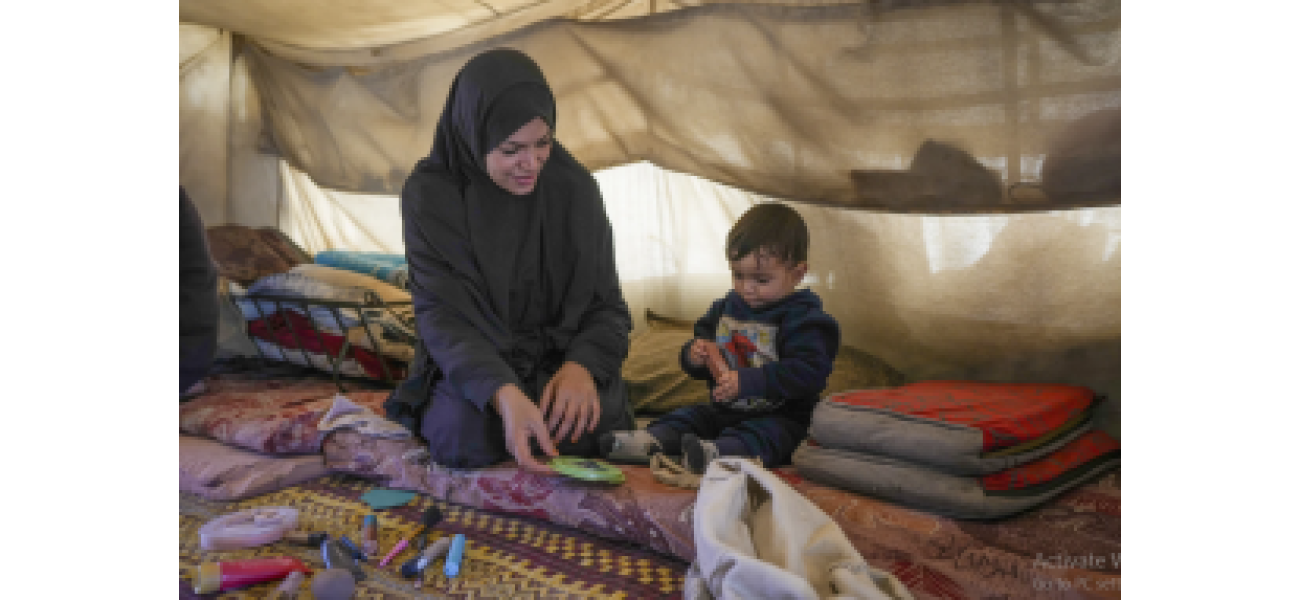Palestinian women in Gaza endure daily challenges in crowded tent camps, with little privacy and harsh living conditions.
Life in Gaza's tent camps is difficult for women due to lack of privacy and limited access to menstrual products, as they are forced to live with extended family and strangers.
December 30th 2024.

In Deir Al-Balah, Gaza, life for women is a constant struggle. The already difficult conditions in the crowded tent camps are made worse by the lack of privacy. Women are forced to share tents with extended family members and even strangers, leaving them with little space to themselves. As a result, something as simple as getting dressed modestly becomes a daily challenge.
To make matters worse, access to menstrual products is limited in the camps. Women often resort to using cut up sheets or old clothing as pads. The makeshift toilets, consisting of a hole in the sand surrounded by hanging sheets, are shared by dozens of people. The lack of proper hygiene and privacy takes a toll on the women's dignity and sense of self.
Alaa Hamami, a young mother of three, has found a way to cope with the modesty issue by constantly wearing her prayer shawl, a black cloth that covers her head and upper body. She explains that in the past, she would only wear it during her daily prayers. However, with so many men around, she now keeps it on all the time, even while sleeping, just in case they need to flee quickly from an Israeli strike.
The ongoing Israeli campaign in Gaza has forced 90% of its 2.3 million Palestinians out of their homes. Hundreds of thousands of them are now living in cramped tent camps, where basic necessities like food, water, and shelter are hard to come by. The lack of proper sanitation and harsh weather conditions only add to their struggles.
Wafaa Nasrallah, a displaced mother of two, shares the difficulties she faces in the camps. She cannot afford menstrual pads and has to resort to using pieces of cloth or even diapers. The UN reports that over 690,000 women and girls in Gaza require menstrual hygiene products, but aid workers have been unable to meet the demand due to supply shortages and exorbitant prices.
Doaa Hellis, a mother of three living in a camp, explains how they have to tear up old clothes to use as pads. She also mentions the high cost of purchasing pads, which is unaffordable for most families in the camps. As a result, women have to choose between buying pads or buying food and water for their families.
Anera, a rights group in Gaza, notes that some women use birth control pills to stop their periods, while others have experienced disruptions in their cycles due to stress and trauma from repeated displacement. These terrible conditions pose a real threat to women's health, says Amal Seyam, the director of the Women's Affairs Center in Gaza. She mentions the risk of skin diseases, reproductive health issues, and psychological conditions caused by a lack of proper hygiene and access to menstrual products.
Hamami, who now lives in a small tent with 13 other family members, shares her daily routine. Between caring for her children, washing laundry, cooking, and waiting in line for water, she has no time to take care of herself. She reminisces about her life before the war, where she had a wardrobe full of everything she needed, and they would go out for walks and attend parties and events. Now, all she has left is a broken mirror and a crumbling makeup compact, which serve as reminders of her life before the war.
Many women in Gaza have lost their sense of self and their rights in this war. Seyam notes that some girls have been forced into early marriages to escape the suffocating environment of their family's tents. She emphasizes that women are always the ones who pay the biggest price in such conflicts. The ongoing Israeli campaign in Gaza has already taken the lives of over 45,000 Palestinians, more than half of them women and children. It's a humanitarian disaster that continues to affect the lives of innocent civilians, especially women, who struggle daily to meet even their most basic needs.
To make matters worse, access to menstrual products is limited in the camps. Women often resort to using cut up sheets or old clothing as pads. The makeshift toilets, consisting of a hole in the sand surrounded by hanging sheets, are shared by dozens of people. The lack of proper hygiene and privacy takes a toll on the women's dignity and sense of self.
Alaa Hamami, a young mother of three, has found a way to cope with the modesty issue by constantly wearing her prayer shawl, a black cloth that covers her head and upper body. She explains that in the past, she would only wear it during her daily prayers. However, with so many men around, she now keeps it on all the time, even while sleeping, just in case they need to flee quickly from an Israeli strike.
The ongoing Israeli campaign in Gaza has forced 90% of its 2.3 million Palestinians out of their homes. Hundreds of thousands of them are now living in cramped tent camps, where basic necessities like food, water, and shelter are hard to come by. The lack of proper sanitation and harsh weather conditions only add to their struggles.
Wafaa Nasrallah, a displaced mother of two, shares the difficulties she faces in the camps. She cannot afford menstrual pads and has to resort to using pieces of cloth or even diapers. The UN reports that over 690,000 women and girls in Gaza require menstrual hygiene products, but aid workers have been unable to meet the demand due to supply shortages and exorbitant prices.
Doaa Hellis, a mother of three living in a camp, explains how they have to tear up old clothes to use as pads. She also mentions the high cost of purchasing pads, which is unaffordable for most families in the camps. As a result, women have to choose between buying pads or buying food and water for their families.
Anera, a rights group in Gaza, notes that some women use birth control pills to stop their periods, while others have experienced disruptions in their cycles due to stress and trauma from repeated displacement. These terrible conditions pose a real threat to women's health, says Amal Seyam, the director of the Women's Affairs Center in Gaza. She mentions the risk of skin diseases, reproductive health issues, and psychological conditions caused by a lack of proper hygiene and access to menstrual products.
Hamami, who now lives in a small tent with 13 other family members, shares her daily routine. Between caring for her children, washing laundry, cooking, and waiting in line for water, she has no time to take care of herself. She reminisces about her life before the war, where she had a wardrobe full of everything she needed, and they would go out for walks and attend parties and events. Now, all she has left is a broken mirror and a crumbling makeup compact, which serve as reminders of her life before the war.
Many women in Gaza have lost their sense of self and their rights in this war. Seyam notes that some girls have been forced into early marriages to escape the suffocating environment of their family's tents. She emphasizes that women are always the ones who pay the biggest price in such conflicts. The ongoing Israeli campaign in Gaza has already taken the lives of over 45,000 Palestinians, more than half of them women and children. It's a humanitarian disaster that continues to affect the lives of innocent civilians, especially women, who struggle daily to meet even their most basic needs.
[This article has been trending online recently and has been generated with AI. Your feed is customized.]
[Generative AI is experimental.]
0
0
Submit Comment





